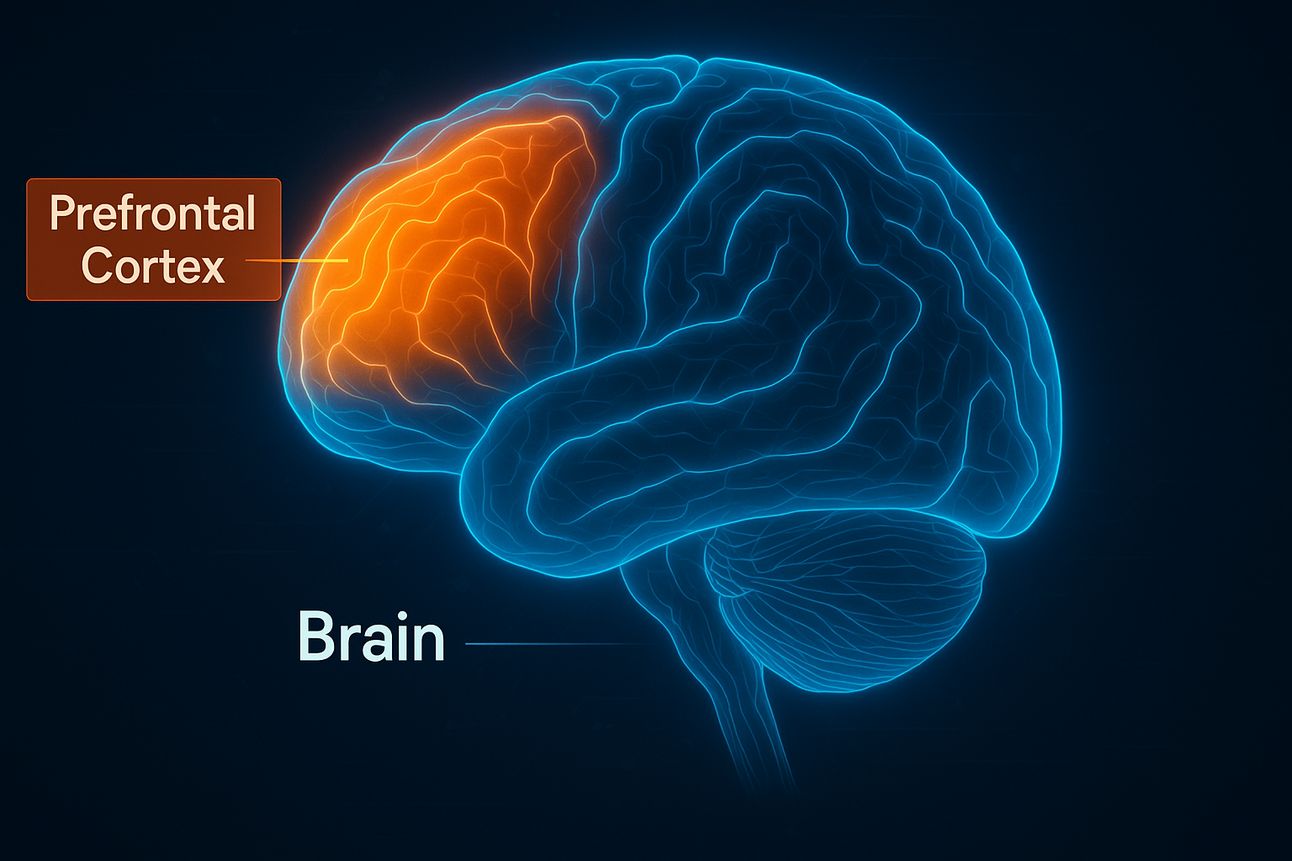- 40-something
- Posts
- Love your brain: How to nourish the prefrontal cortex
Love your brain: How to nourish the prefrontal cortex
Food and supplements for better focus, decisions, and well-being.
The human brain is a marvel of nature, but among its many parts, the prefrontal cortex (PFC) stands out as the true CEO of our mental operations. Nestled just behind your forehead, this powerful brain region is responsible for some of our most important higher-order functions—like planning, decision-making, impulse control, and self-awareness.
But how often do we stop to think about how we’re treating this vital part of ourselves? If you're often forgetful, distracted, or struggling to make good decisions, your prefrontal cortex might be calling out for more love—and the good news is, you can support it through intentional nutrition.
What does the prefrontal cortex do?
Think of the prefrontal cortex as the executive command centre of your brain. It plays a critical role in:
Focus and attention: Helping you zero in on tasks and resist distractions.
Impulse control: Helping you pause before reacting or reaching for that third cookie.
Decision-making and reasoning: Weighing pros and cons, setting goals, and thinking ahead.
Emotional regulation: Balancing logic and feeling, helping you respond rather than react.
Empathy and social behaviour: Understanding others’ emotions and acting with kindness.
Without a healthy prefrontal cortex, life becomes chaotic. Poor memory, emotional outbursts, risky decisions, and lack of focus are common symptoms when this brain region is undernourished or overstressed.

Loving your brain through nutrition
Your prefrontal cortex is hungry—but not for sugar and processed junk. It thrives on specific nutrients that support mental clarity, cellular health, and stable mood.
Here's how you can feed it well:
1. Healthy fats are brain gold
Your brain is about 60% fat, and omega-3 fatty acids are key to keeping the PFC sharp.
What to eat: Wild salmon, walnuts, flaxseeds, chia seeds, sardines, and seaweed.
Why: Omega-3s (especially DHA) are crucial for brain cell communication and reducing inflammation.
2. Balance blood sugar to boost focus
Fluctuating blood sugar levels can lead to brain fog and mood swings. Stable energy = better brain function.
What to eat: Low-glycemic foods like leafy greens, whole grains (in moderation), berries, and legumes.
Avoid: Excess sugar, white bread, soda, and ultra-processed snacks.
3. Feed it antioxidants
Oxidative stress ages the brain. Antioxidants help protect it—especially your hardworking PFC.
What to eat: Blueberries, spinach, dark chocolate (in moderation), green tea, and turmeric.
Why: These reduce free radical damage and support memory and cognition.
4. Don’t skip protein
Amino acids from protein are the building blocks for neurotransmitters like dopamine, which your prefrontal cortex uses to stay motivated and focused.
What to eat: Eggs, lean meats, tofu, tempeh, lentils, and Greek yogurt.
Tip: Start your day with a protein-rich breakfast to prime your brain.
5. Hydration = detter decisions
Even mild dehydration impairs concentration and decision-making.
Drink: Plenty of water, herbal teas, and mineral-rich fluids like coconut water.
Avoid: Excess caffeine and alcohol, which can dehydrate the brain.
Supplements for your brain
In addition to whole foods, certain supplements can help fill nutritional gaps and give your brain—especially your prefrontal cortex—a cognitive edge.
Here are a few scientifically supported ones to consider:
Omega-3 Fish Oil (DHA & EPA): Enhances memory, focus, and overall brain function by supporting cell membrane integrity and reducing inflammation.
L-Theanine: Found naturally in green tea, this amino acid promotes calm focus and improves attention when paired with caffeine.
Vitamin D3: Essential for mood regulation and neuroprotection; low levels have been linked to cognitive decline and depression.
Magnesium (especially Magnesium L-Threonate): Supports memory, learning, and stress resilience by enhancing synaptic plasticity and calming the nervous system.
B-Complex Vitamins (especially B6, B9, B12): Vital for energy production, neurotransmitter synthesis, and reducing brain fog.
Lion’s Mane Mushroom: A nootropic that may stimulate nerve growth factor (NGF), aiding memory, focus, and long-term brain health.
Rhodiola Rosea: An adaptogen that can enhance mental clarity and reduce fatigue by balancing cortisol levels.
Bonus brain-loving habits
Nutrition is powerful—but pairing it with brain-healthy habits can take your mental clarity and emotional resilience to the next level:
Sleep: The PFC relies on deep, uninterrupted sleep to process emotions and store memories.
Mindfulness and meditation: These help strengthen the prefrontal cortex and increase grey matter.
Daily movement: Physical activity improves blood flow to the brain and boosts mood-regulating chemicals.
Limit toxins: Avoid smoking, heavy alcohol use, and environmental pollutants when possible.
Nurture the CEO of you
Your prefrontal cortex is responsible for the quality of your choices, emotions, and relationships—it is you at your best. By choosing brain-nourishing foods and habits, you're not just investing in better mental performance today—you're protecting your long-term mental health and emotional well-being.
So, the next time you reach for a snack or skip a meal, ask yourself: “Is this helping me love my brain today?” With a few conscious choices, you can fuel the most powerful part of you—one bite at a time.
Remember: Use your brain to make the right food choices.
Umayya xxx